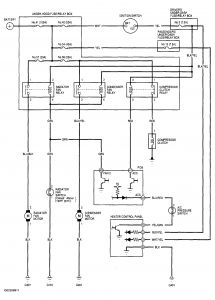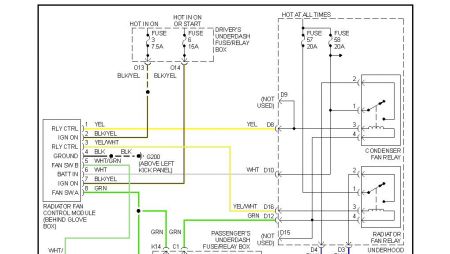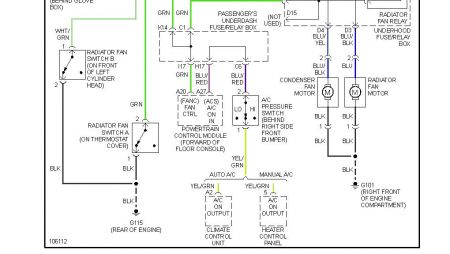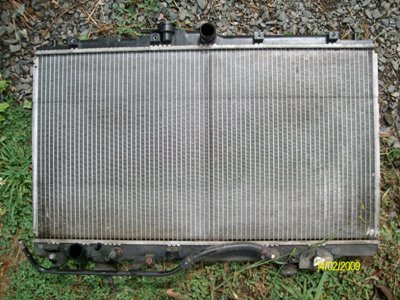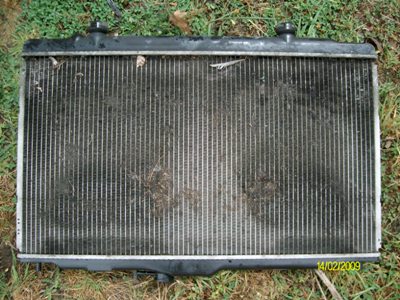Further to this problem:
Under standard driving conditions the cooling system operates normally but once I start to drive up any lengthy hill (say a kilometre or more) the car begins to overheat (temperature gauge goes from just above a quarter to 3/4) very quickly. If I turn the aircon off, the temperature slowly returns to normal even if still going uphill. If I drive the car without the aircon on, the car does not overheat regardless of operating on the flat or on hills. The problem has arisen since the weather in New Zealand has got hotter, although that might be co-incidence. (NZ is right hand drive, all distances are in kilometres and I think Accord in NZ = Acura in US).
Things I have noticed associated with the problem:
If I don't notice the temparture rise (as I said it happens quickly) my first indication is that the aircon looses its cooling effect like some sort of switch has recognised the need to automatically turn off aircon to help the engine cool itself.
If I turn the car off when it has overheated, the radiator fan comes on for several minutes after engine shutdown. I think this is what it should do to help cool the engine down.
Car Details:
Car: 1998 Honda Accord VTI-L 3.0 V6
VIN: 7A3CG1640WNVG 0066
ENG: J30A113385530
Mileage: 200,340kms
Things I have done so far:
When the problem occurs I have stopped the car, left the engine running, opened the bonnet and checked that both fans are working. No problems there, but of course I don't know if one or both fans momentarily did not work (causing overheat) then started again so that by the time I have stopped the car and checked under the bonnet that are happily spinning. Due to the potential of expensive engine damage I am reluctant to continue to operate the car in the overheated condition just to just see if by chance the engine will cool again all by itself as a result of intermittent fan operation.
As explained above, the radiator fan also comes on after engine shutdown when the motor is overheated. In addition, I have noted the aircon fan starting with engine start (and aircon on). It seems the fans are both working as expected.
I have checked the coolant level at cold. Coolant is 50/50 antifreeze and has been relpaced recently. I can confirm the radiator is full to the neck and the header tank has fluid to the minimum mark. There are no leaks and the coolant level remained constant (no top ups required) before and after its replacement.
I have checked the radiator and condensor fins and there are no obvious signs of external blockage or damage that might affect cooling.
I have replaced the thermostat with an OEM part and have also replaced the water pump. I have noted the condition of the antifreeze which was very good and also the cleanliness of the internal passages at the water pump, thermstat and radiator filler neck entrances. There are no signs of any corrosion. I suppose there could still be an internal blockage but it seems unlikely given the shiny/clean nature of all the interanl passages I can see.
I have replaced the radiator cap with an OEM part.
I have replaced the fan control module and have also replaced the radiator and condensor fan relays.
The only items left to replace are the temperature control switches A and B and the engine coolant temperature (ECT) sensor although I think the ECT sensor is unlikley to be the culprit. I say this because the temperature gauge indications of engine overheating, seem to be supported by the fan going on after engine shutdown. The check engine light has not come on either which might be expected if the sensor was faulty. Am I wrong?
If the problem is with one of the temp control switches, which one is it likely to be? A or B and which one is A and which one is B. I don't want to replace more needless parts. Am I on the right track or is the overheating simply a sympton of something a miss in the aircon system? The engine remains at normal operating temparture with the aircon off so could this in fact be a problem with the aircon system for eg, might there be an internal blocakge in the condensor? Does refrigerant block condensor passages?
Thanks for the assistance so far.
Any further help would be most appreciated.
Regards
Terry
Sunday, January 5th, 2020 AT 7:06 PM
(Merged)
